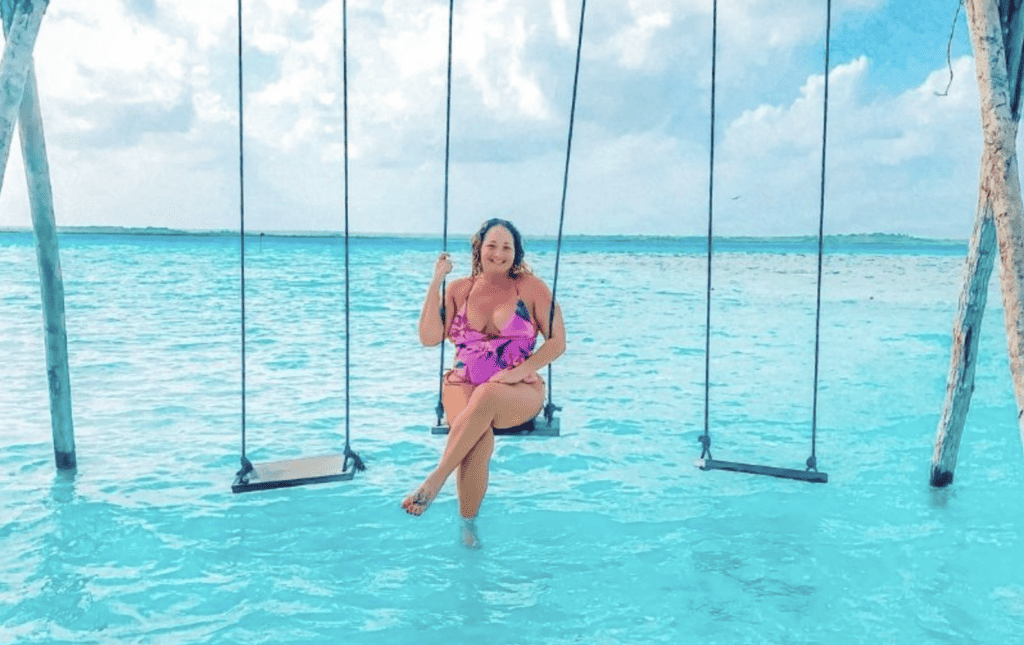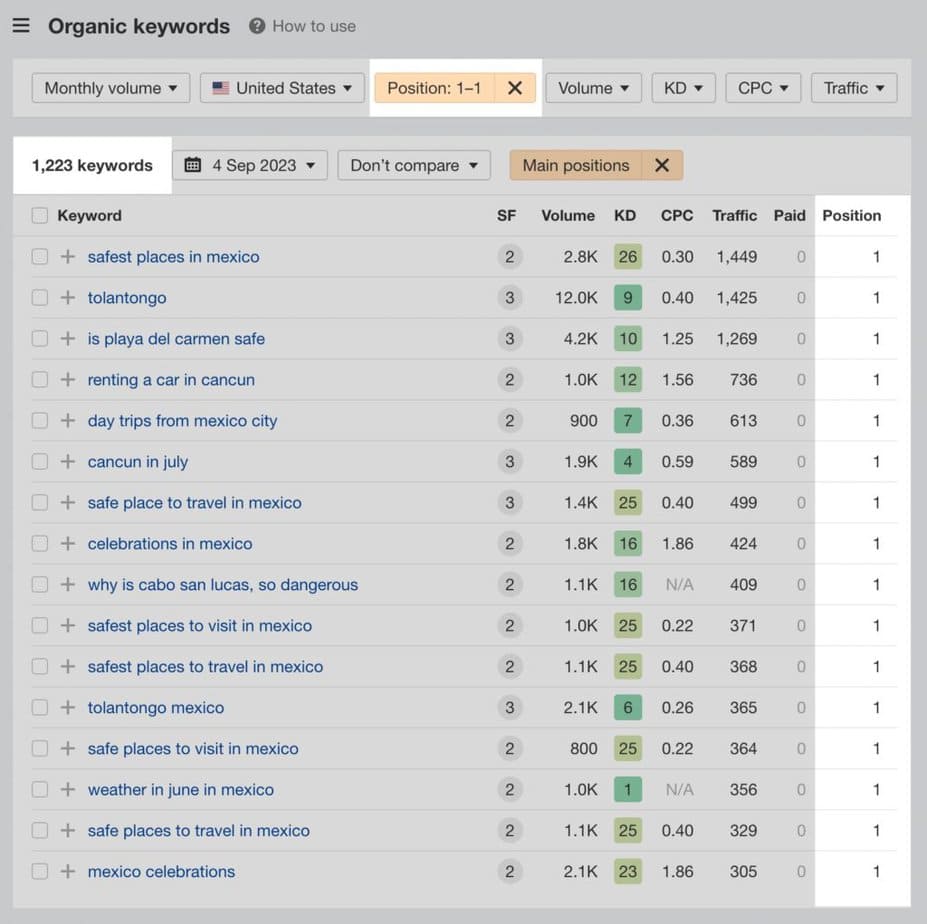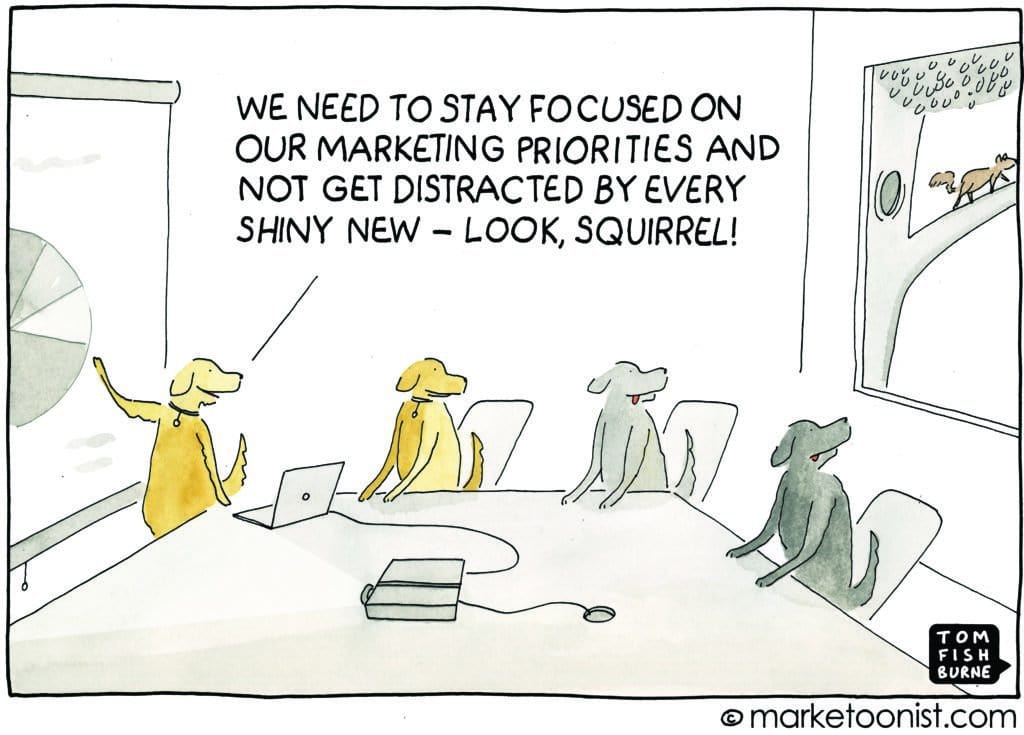
Hey Shelley! Before we dive into the specifics, can you please share more about your background?
I left Corporate America and started exploring the digital nomad lifestyle. I have a degree in Journalism, but contrary to what people think, it doesn’t necessarily give me an advantage in blogging. Writing for print and writing for SEO is completely different.
I transitioned from corporate life to blogging, networking, learning from free content, then investing in courses. Now, I’m a multiple 6-figure blogger with 4 travel blogs and a 5th blog about blogging.
How do your blogs make money and how much?

I started my first site, called Travel Mexico Solo, in April 2020 at the height of the pandemic when no one was traveling. I thought it would be a joke. But it’s now a 7-figure business, which is crazy. For the entire first year of 2020, I felt like I was doing everything wrong.
But by the end of that year, I took a blogging course. It made me realize there’s a method to blogging. So, in 2021, I started keeping track of my money. By the end of my first full year of blogging, I made $8,490.
Then, fast forward another year to 2022, and I made $272,569. As of today, we’re halfway through January, and I had my biggest month yet, making $52,604.
That’s amazing. How did you get there?
In 2021, the Airbnb affiliate program still existed. It was a huge thing and I saw bloggers making a lot of money from it. I started affiliate marketing and soon got my first check from Airbnb. But then they shut down the program. I got pretty discouraged but then realized I could make money with affiliate marketing. It’s just one program that shut down. So, I went all in. I took courses and hired a mentor. Whenever something worked, I just scaled it. Affiliate marketing was the first thing that made me money.
70% of the revenue comes from my first site, which has about 282,000 traffic in the last 30 days. My second site, about a year and a half old, brings in about 60k sessions a month.
What were the tactics you used?
The biggest 2 things that happened were leaving a terrible host and getting onto a good host and switching from a theme that was tanking my site in terms of speed to a really fast theme. Those changes both happened around July-August 2021, and my traffic tripled in one month without making any other changes.
From there, the sites got onto Mediavine, and they started ranking number 1 on Google. You have to remember also that my site is super niche. It’s Mexico-centric. But around a year and 3 months in, Google started loving my site. The site’s speed was a significant factor. People often neglect site speed and focus on content, but to get the top positions and drive traffic, you need to prioritize speed.
From there, I started creating affiliate-heavy posts. There are 2 ways to drive traffic: either by paying for ads or through SEO. So, I focused on SEO. I had one article that started earning $1,000 a month. I won’t name the article, but I started looking for other opportunities with that affiliate using similar keywords. I wrote like 10 variants of that same article, and 1 month I made $1,200, and the next it was $4,400.
What do you mean by writing 10 different variants of 1 article?

Let’s say you have an article about the “best hotels in LA”. A variant might be “best hotels in LA for families” or “best hotels in LA with free airport transportation”. It’s about going after long-tail keywords.
For example, if you’re doing well with Booking.com, you’ll need to look for other opportunities and create variants of articles. User intent is crucial. People often mistake putting links as doing affiliate marketing, but it’s deeper than that. It’s about understanding why someone is searching for something on Google.
For instance, someone searching for “best tours in LA” isn’t sure of what they want. But someone looking for “best food tours in LA” knows exactly what they want. I target those at the bottom of the sales funnel, ready to buy. It’s about putting the right content in front of the right audience.
When doing keyword research, if “best hotels in LA” has 25,000 monthly searches and “best pet-friendly hotels in LA” has 1,200, it makes sense to target the latter as they have a specific need.
How do you know whether to write the article on the “best pet-friendly hotels in LA” or just include it in a bigger buying guide “best hotels in LA”?
I go off of what the data tells me. I do look at keyword research, search volume, and I use Ahrefs too. Pet travel is a billion-dollar industry. There’s zero percent chance, whatever keywords are just telling me, I know people are searching for hotels in LA that are pet-friendly. But I defer to data.
If you go to the key search and start looking, all the long tail keywords are going to show, and you can pick the best one. You can see in that URL column of key search, even if the top 10 is like hotels.com, booking.com, TripAdvisor, if no one’s written that piece of content, don’t let that scare you. I’ve never let that scare me. I defer to data for sure.
How many travel affiliate programs did you try out?
I’m actually not in that many programs. People ask me that all the time. I just believe in what’s working and how I can do more of that. Amazon did okay, but for travel, it’s not the best.
For travel, there are better options like accommodations, hotels, car rentals, travel insurance, and tours. Amazon or physical products is the 5th one. If you’re in hiking or outdoors, I would encourage you to look at the REI program. But I just stick to what travelers want. I’m not trying to reinvent the wheel.
You’ve got hundreds of search terms at a #1 position on Google. How did you do it?

The riches are in the niches. My site is niche. I have an authoritative site on one topic, and I just know I can rank for it. You monitor your rankings after that. To be specific, 282,000 page views in the last 30 days to my site, 50% of which comes from 3 articles.
I just monitor those and see what’s ranking. When you have an authority in a niche, you just know. I just know that if I write about Mexico, it’s going to rank.
Trying to write LA stuff – I don’t have a chance. So I think I just have really carved out a little piece of the market, so to speak. But I think you can also do that through content pillars. I don’t think you need a site that’s super dedicated.
I say that all the time. When you start reaching a certain level, people ask, “What are you doing?” It starts being like, “Well, you’re just special.” And I’m like, I’m not just special. I’ve made it hard not to be picked number 1.
Of course, there are a couple of articles that do not rank, they’re in the wasteland of page 2, and there’s nothing I can do. I’ve been trying so hard, and I have more victories than failures. But it happens. You just go hard at it, throw everything at it, and don’t stop until it gets to number 1. That’s how you succeed, by never quitting.
Do you write all the articles for your websites now? Did you transition into having writers?
I have two full-time writers. I go in and out with a couple of other writers. I am able to really turn content into more content if that makes sense. I don’t write too much anymore. I do have a team now: an editor, a blog manager, and a layout person, and I’m hiring writers.
But I do train them in how I’ve done it all along because I don’t know what the thing was that I did right. I go keyword-heavy. The outline is very important; seeing what is ranking in the top 10 is very important, and then just doing that better.
Do you do your outlines yourself and then maybe hand them off to a writer?
I’ve always done the outlines because if you don’t have a firm foundation, putting a bunch of keywords into it won’t make sense. The headings for Google are a big thing. Most people are scrolling your posts, not reading everywhere.
So yes, outlines are super important, and I have always done my own but I’m trying to delegate that one soon as well.
How much of a contributor was link-building to the growth of these websites?
I did so many collaborations with other bloggers. I did so many guest posts in my first year of blogging. I truly believe in the power of backlinks. I still do it for all my sites. I have a high authority site or higher authority site so I can link to the other ones through that one but I know that’s also part of the reason that they’ve grown quickly too.
Everything starts from day 1. I go for the highest volume that I can possibly get with the lowest competition keywords. In my head, it’s like the faster I can get a few things ranking number 1 on Google, the faster Google’s like, “Hey, what’s this site all about?”
How much “info content” and “affiliate content” do you write for your site? Do you follow a ratio?
I would say don’t really think about it too much. 2 out of 2 of my sites are monetized through Mediavine ads, so I do want content that just brings in traffic because I make money that way, too. But my affiliate content is great content, too. I mean, if I took the affiliate links out I’d still rank number 1.
Make sure you’re delivering on the keyword and then Google sees all that too. They see that your user didn’t go back to the search results because they didn’t have to keep looking, so that’s going to be good for you regardless if it’s an affiliate post or not.
Don’t start a new site unless you have a goal in mind. Don’t just start a new site for the sake of starting one, especially if you’re not seeing significant income for several months.
Don’t go all in on a second site if you haven’t achieved success with the first one. I’m a big fan of focusing on one site at a time. To me, these websites are digital properties or assets that I might sell one day. I’m forward-thinking in that sense. But don’t just start a second site because you’re chasing after the next shiny thing.
It seems like you’re naturally immune to the “shiny object syndrome.” It’s clear that you focus on doing one thing well.

I guess by nature, I don’t easily get distracted by new ideas. I’m more of a “do one thing” person. I’ve always focused on what’s working and doubled down on it. When people mention having a very niche site, they might think it’s limiting. But what’s not limiting is my income. That has opened up the world to me.
Many people have romanticized ideas about writing, but in reality, it’s hard work. If you want it to be your job, you have to treat it like one. Not all aspects of our jobs are fun, but there are many rewards, like living and working on my own terms.
You’ve mostly discussed SEO. Do you employ other strategies for these websites, such as email marketing or social media?
I don’t do social media at all, by choice. When I started in April 2020, platforms like Pinterest had big algorithm changes that affected many creators.
I’ve heard many say, “The money’s in the list,” so I began building an email list early on. However, monetizing that list for travel has been a challenge. For blogging about blogging, my email list works well, and I can monetize it naturally. I also do email marketing, but I’ve learned not to waste time on social media.
You mentioned you have a site geared toward helping content creators with affiliate marketing. Can you share that?
Sure! My website is travelblogging101.com. There’s a free video mini-course about the 5 affiliate programs I recommend. Affiliate marketing is another income channel alongside ad revenue. Even though I make decent money with Mediavine because of high traffic, affiliate marketing still constitutes about 65% of my income.

